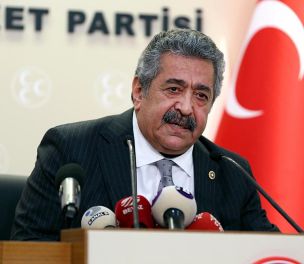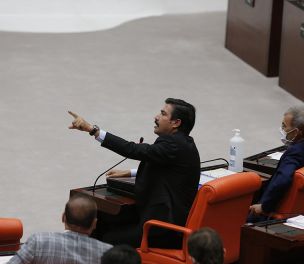* Image: Anadolu Agency (AA)
Click to read the article in Turkish (1) (2)
Jointly prepared by the ruling Justice and Development Party (AKP) and Nationalist Movement Party (MHP), the social media bill passed the Parliamentary Justice Commission last week. It is now expected to be debated and taken to vote at the General Assembly of the Parliament.
CLICK - Parliamentary Justice Commission passes social media bill
In this context, Human Rights Watch (HRW) and Amnesty International have released two separate statements to raise concerns about the bill.
'These new restrictions will be damaging'
"The Turkish government's efforts to introduce new powers to control social media will greatly increase online censorship, particularly in light of the country's poor record on freedom of expression," the HRW has said.
Commenting on the social media bill, Tom Porteous, the Deputy Program director at Human Rights Watch, has noted, "If passed, the new law will enable the government to control social media, to get content removed at will, and to arbitrarily target individual users."
"Social media is a lifeline for many people who use it to access news, so this law signals a new dark era of online censorship," he has said and added:
"It is essential for everyone who values and champions free speech to recognize how damaging these new restrictions will be in a country where an autocracy is being constructed by silencing media and all critical voices. Social media companies should loudly and unequivocally call on Turkey to drop this law, and the EU should resolutely back this call."
'It will potentially lead to detention, prosecution'
Amnesty International has also released a statement about the new social media bill, warning that "the amendments to law on social media pose a grave threat to freedom of expression online."
Expressing "alarm" at the law, it has said, "The amendments, seen by our organization, exacerbate risks to those who are already ruthlessly targeted by the authorities for expressing dissenting opinions online."
Amnesty International has expressed its concerns briefly as follows:
"Under the new provisions, the companies' legal representatives in Turkey would be responsible for 'damages' resulting from non-implementation of a court order within 24 hours.
"Given methods currently used by the Turkish authorities to censor online content, this means that the companies' legal representatives could face significant fines or even criminal sanctions.
"The provisions also require social media companies to ensure that users' data is stored within Turkey, which would enable the authorities to request this data and identify social media users more effectively, potentially leading to their detention and prosecution.
'It targets one of the few remaining spaces of freedom of expression'
"The government has claimed that the amendments are necessary to protect the rights of others, and public order and national security.
"While these are all legitimate aims under international human rights law which can justify restrictions to the right to freedom of expression, any limitation also needs to be necessary and proportionate to such aims.
"Amnesty international however believes that already-existing legislation provides powers for the authorities to achieve such aims, including the protection of individuals from violence and abuse online.
"If this is the case as we believe, it appears that the amendments target one of the few remaining – albeit increasingly restricted – spaces where people can express their opinions freely.
'Risk of greater online censorship'
"Amnesty International is concerned that, if the amendments are passed, the government will gain additional powers to enforce with far greater effect its censorship of legitimate free expression online:
"By blocking and removing content online and detaining and prosecuting individuals simply for producing or sharing content online.
"If passed, these amendments would significantly increase the government's powers to force social media companies to censor content online, violating the right to freedom of expression online and contravening international human rights law and standards.
"Furthermore, the amendments would compel social media platforms to reveal the identity of individuals who share content online, putting them at risk of unfair and abusive detentions, prosecutions and convictions.
Recommendations
"The Turkish authorities should instead effectively implement existing legislation to protect those who experience violence and abuse online.
"In particular, Turkish authorities must implement the rulings of the European Court of Human Rights (ECtHR) that have found Turkey in violation of the right to freedom of expression.
"The Turkish authorities should amend the Internet Law and overly vague and broad anti-terrorism and defamation laws, which are frequently used to violate the right to freedom of expression online.
"Moreover, the Turkish authorities should invest in capacity building and training of law enforcement agencies on relevant legislation, gender equality, the harms of online violence and abuse, and best practices to support those who have experienced online violence and abuse
"Restricting expression and relying on blanket prohibitions, in isolation, are ineffective means to combat discrimination.
"Effective protection and social inclusion of groups that are marginalized or that experience violence or abuse online requires broader interventions to counter stereotypes, eradicate discrimination and foster greater equality, including by promoting tolerance, education and dialogue.
"Such steps would be an important advance in protecting the right to freedom of expression and addressing violence and abuse online, as opposed to increasing the authorities' powers to censor and monitor online expression." (RT/HA/SD)





-132.jpg)



-132.jpg)




